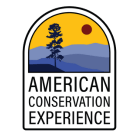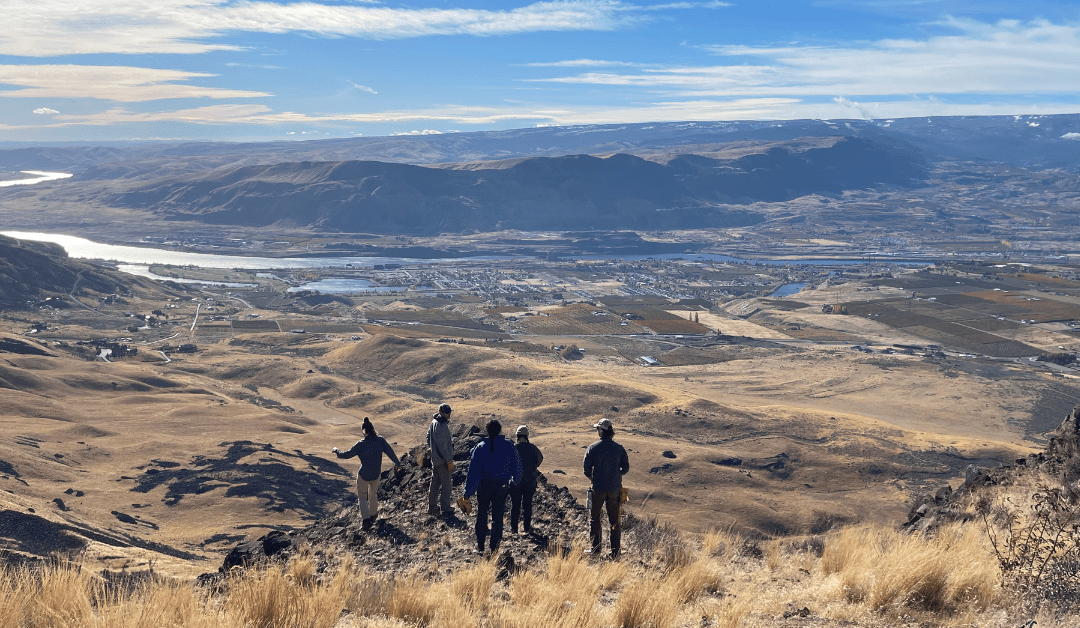Several of our incredible EPIC BLM members share updates and insights as they serve at the Bureau of Land Management’s Wenatchee Field Office in Wenatchee, WA.
1. What is your position/s, field office and general story of the area you get to work in (the forest, the town etc)
Alex: I am a native seed collector/crew lead working through the BLM led program, Seeds of Success, and I am based out of the BLM Wenatchee Field Office. I get to work across the Columbia River Basin throughout central and eastern Washington, from sage steppe and canyons to dry forests or wetlands (collectable plants are everywhere, thankfully🙂)
Alexis: Post-Fire ESR, BLM Wenatchee Field Office. Based in Wenatchee, WA (apple capitol). Office covers all the BLM land in Central Western Washington
Corina: I am a Post-Fire Emergency Stabilization and Rehabilitation (ESR) Member at the Wenatchee Bureau of Land Management (BLM) Office in Washington state. The office covers all of central Washington, from the Canadian border to the Oregon border. This encapsulates a variety of ecosystems, but I am mainly working in Columbia Basin sagebrush shrub-steppe and riparian areas.
Grady: Working as an Emergency Stabilization and Rehabilitator member with the BLM field office in Wenatchee, Washington. Wenatchee is… wait basically exactly what Corina said. It’s a super cool location in central Washington. Everyone should come visit.
Khristian: Hello, I’m a Vegetation Management Intern at the Wenatchee BLM Office. I have worked in Rangeland, Shrupstep, Forest, Riparian, Mountain sides, Mountain tops, and Meadows. There we have sprayed weeds, mechanically removed weeds, educated the public on weeds, and mapped weeds.
Zainab: Hi there! I am a vegetation management intern at the Wenatchee field office. The field office is responsible for the BLM land encompassing central Washington, with the Cascade Mountains acting as the eastern border, Canada in the north, Oregon state in the south, and the Grand Coulee in the west. I live in town, and computer days are based out of the field office, but field days vary greatly and include pastures/rangeland, mountains, forests, and riparian ecosystems.
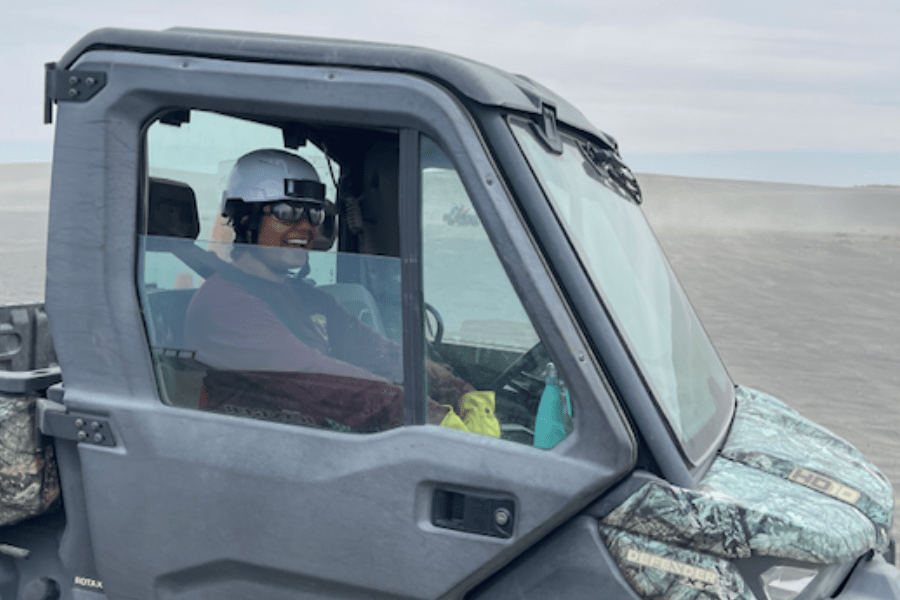
Zainab in UTV
2. How has your role within ACE and your field office been influenced by your career goals and how has it maybe influenced new ones? Has working together and in this role given you insight in your goals?
Alex: I have always wanted to dive into the world of botany and coming from Wisconsin, I thought the ecosystems of the western US states would be a unique way to experience plants. Following my time here, I would really like to come into a natural resources specialist role, incorporating multiple scientific disciplines on a daily basis!
Alexis: My career goal is to do wildfire effects monitoring and/or forest research in pyro endemic ecosystems, so post-fire ESR is a perfect position for me as I try to begin my career.
Corina: I am someone who has a lot of interests within the environmental science field, which has not helped my innate aversion to making decisions. Thankfully, this position I found was something I have been wanting to explore and I have had multiple opportunities to go out in the field with other ACE members who hold different positions and with BLM scientists who are in different fields. I have been able to discover so much about myself and learn from some amazing people while working my term.
Grady: Working with the BLM has given me insight into what working with the federal government on conservation projects is like. It allows me to see its many strengths, but also the gaps that could be filled by work from nonprofits. I believe the environment benefits best when civil society and the government work together, and I’m extremely grateful to have the opportunity to see this at play during my ACE internship.
Khristian: I’ve been working with invasive and native plants all over the world for about 8 years. This internship has provided a lot of new knowledge and has helped me with my career path.
Zainab: To be quite frank, I accepted this internship because I like plants and I needed a credit to complete my GIS certificate that stipulated real life work. What I found after I took this internship was so much more than just credit hours and has really broadened my horizons in terms of what I can see myself being content doing for the rest of my life. From surveying mines on behalf of contractors interested in BLM land, or disturbed areas for noxious weeds, to spraying and mapping chemical treatments, even talking to ranchers and asking what their main issues with their land is; it is so fun doing it, and there is so much left to do. Further, it is amazing and deeply satisfying how interconnected all the staff’s projects are, and being able to do my job helps all involved at the field office.

Alex, Zainab, Khristian and Chris – Post Fire
3. What advice would you give other early career workers in this field after your time here – anything you loved specifically about this area, what have you learned and want to share?
Alex: Don’t be afraid to make big changes in your life – especially if you feel passionate about something! Trust in yourself and your own capabilities and don’t let anybody tell you anything different.
Corina: Find a term/position with the BLM! This is my second experience working with the BLM and I have found that the scientists are incredibly kind and hardworking, you get to work directly alongside them in the field and in the office, and they encourage you to go out with others to explore other fields.
Grady: Be kind and open to meeting new people.
Khristian: The advice I would give them is to take every possibility that is given to them. If they’re doing an event on the week day or the weekend tag along. Always take every opportunity. Even ask to go with them or if they know anyone doing anything and you can go along.
Zainab: Have an open mind and try everything at least three times. Take the time to listen to your body. Be gentle with yourself, especially if you are doing things that you’ve never done before. Everyone is here to help you 🙂 My favorite things about Wenatchee have been the small town vibes, the fresh fruit stands, and the absolutely beautiful views that central Washington has to offer.
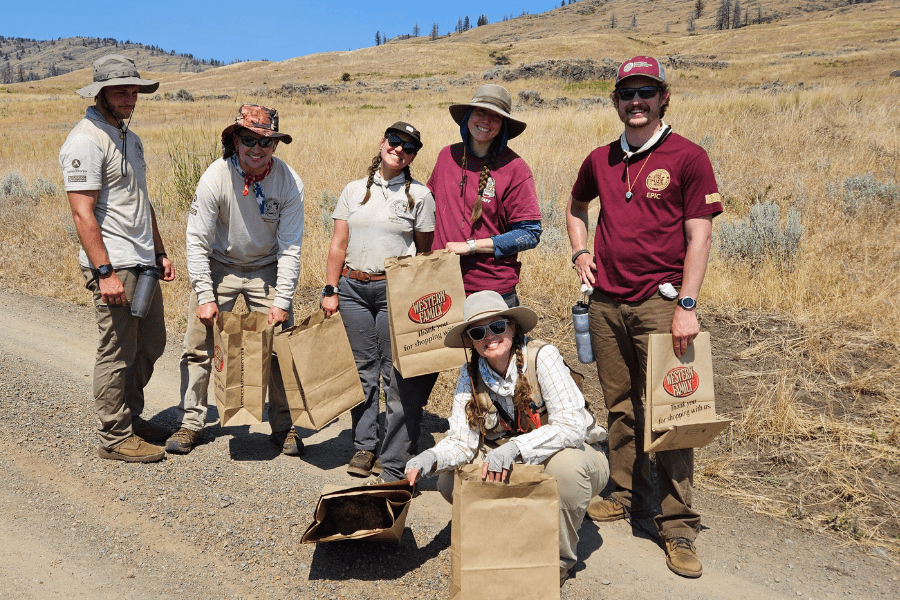
Alex, Molly and ACE Crew with BLM Scientist Molly
4. Share some books, podcasts, playlists etc that you have used while working in remote areas, enjoyed etc!
Alex: My favorite podcast is “Normal Gossip” – for when I need to get my fill of unnecessary drama. I also have a country playlist that fits the sage steppe mood pretty well!
Corina: Alex has a great “cowboy” playlist that I pester him to play whenever possible. I also have become a Sudoku fanatic whenever I get a spare second.
Grady: Commanding Hope by Thomas Homer-Dixon and Braiding Sweetgrass by Robin Wall Kimmerer.
Khristian: I highly recommend any books from Pojar. A great author that really knows what she’s doing. She specializes in plant biology and identification. Also the books she’s helped have written fun facts at the bottom.
Zainab:
1. Weeds of the West by Larry C Burrill: really useful for identifying noxious weeds.
2. Biology and Management of Noxious Rangeland Weeds by Roger L. Sheley and Janet K. Petroff: includes best chemicals to use for various weeds.
3. Roadside Geology of Washington by Marli B. Miller and Darrel S. Cowan: so cool.
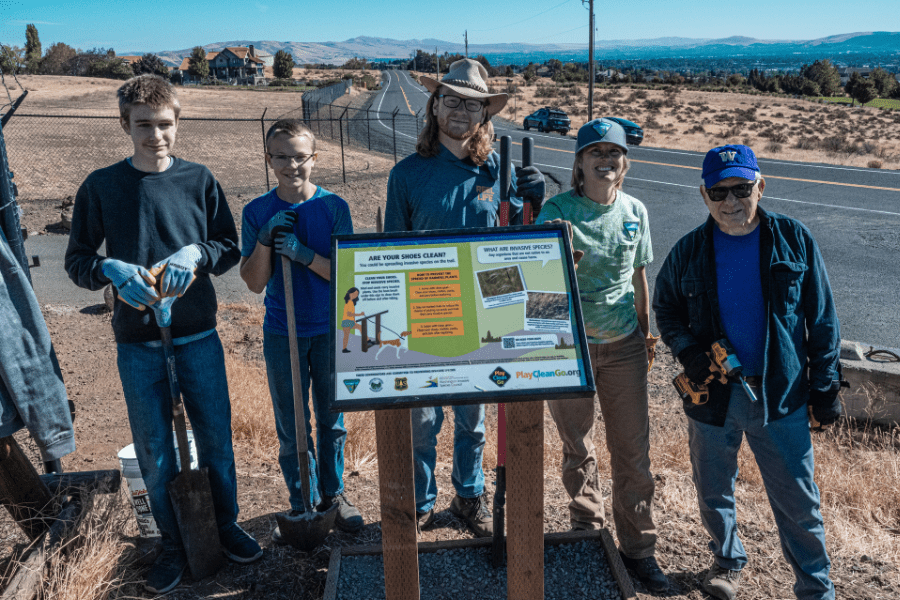
Khristian with Clarinda and Group
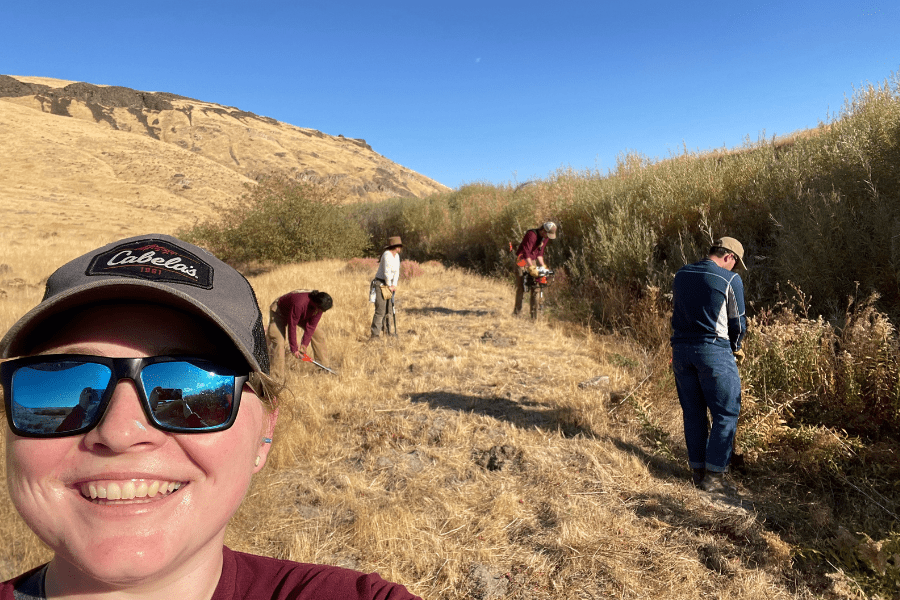
ACE Members in the Field
